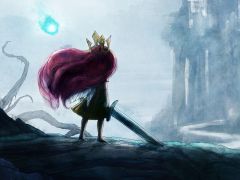Video Gamer is reader-supported. When you buy through links on our site, we may earn an affiliate commission. Prices subject to change. Learn more
Child of Light features a great battle mechanic with lots of interesting ideas. At its core, the system is turn-based, but with the help of Igniculus (main character Aurora’s glowing companion) you can hinder the progress of enemies through the move timeline. There are also a number of glowing plants in each battle, which Igniculus can fly through to collect health, mana or ‘wishes’.
Each character in the game has a speed stat, which affects how fast they move through the ‘Wait’ and ‘Cast’ bars. Listed below each move or item is its cast speed, which gives you an indication of how long the action will take before happening.
Aurora is a medium-speed character (unless you improve her through boosters found in Lemuria). Rubella, the female jester, is one of the quickest characters, and can cast faster than most enemies.
If you hit an enemy while they are in the casting phase, they will be knocked back in the timeline, delaying the attack. Equally, if an enemy hits you, your attack will be cancelled and you’ll have to wait until you’re back in the cast phase. It’s technically possible to defeat an enemy without it ever having the chance to attack you, but this is only feasible against a single foe.
As well as casting, you have the option to ‘Defend’. This happens immediately, and lessens the impact of enemy moves. You will be sent back to the start of the timeline, but move through it much quicker, so it’s worth doing if multiple enemies are on the brink of casting.
Different enemies are weak to different attacks. As well as magic attacks, you can also apply modifiers to weapons using Oculi. Oculi can be collected from treasure chests and as battle rewards. They are available in different sizes, meaning they can have a greater impact on your team. You can apply three Oculi to each character: one to their sword (attack), one to the shield (defence), and the other to affect overall stats, be it health, MP, casting etc. You can also craft new Oculi by combining up to three.
Throughout the course of the game, new people will join your party, but you can only have two in battle at any one time (Igniculus doesn’t count as an active member). You can switch between allies on the fly when casting. Switching doesn’t cost a turn, so if one character is more effective for a battle, you can change without any negative effect.
Battle tips
- At the end of each battle, use Igniculus to sweep up any health/mana left in the plants on the battlefield. You have to be quick, as the post-fight screen will appear a few seconds after the last enemy dies, but collecting is important if allies are low on health and not close to levelling up.
- Give different Oculi to each of your characters. Having different attacks leaves you better prepared for different enemy types. Blue enemies are water types, and weak to electric; enemies who look as though they are wrapped in paper are weak to fire; flaming enemies are weak to water; and dark foes are weak to light. Remember, switching characters mid-battle doesn’t cost a turn, so feel free to switch to whomever is most effective.
- If you come across an enemy in the world, use Igniculus to blind them. This guarantees a surprise strike, granting you the first hit in the fight.
- If an enemy is ahead of you in the timeline, use an attack that is quick, rather than the most effective move. It’s better to avoid being hit and getting the chance to attack twice than defend and wait.
- Don’t keep Igniculus shining on an enemy constantly, time it so that they are in the cast zone as you attack. This may mean switching Igniculus’ shine on and off throughout the encounter, but practice makes perfect, and you’ll soon learn how to effectively time hits.
- The closer an enemy is to attacking, the less they’ll be knocked back when you hit them, keep this in mind when looking at Igniculus’ shine bar.
- Don’t mop up all plants in the level at once, stagger it so that as you use one, another becomes available again, so you always have wishes or health to collect should things get messy
- Save your modifier potions for later in the game. Lull, Unstoppable and other such elixirs prove very useful against the tougher enemies, as it allows you to use two attack-focused characters rather than keeping a mage on the battlefield.
